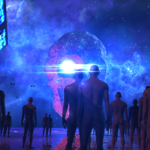I’m always on the lookout for interesting projects that relate to deep-seated issues of the human condition and the future of society and, as anybody who has read my recent novel When Winter Calls will know, I also enjoy interesting dystopian fiction that takes us away from the usual post-apocalyptic visions and into more unique and intriguing territory.
When I came across the short for Novek, I was immediately interested in the world-building and the clear talent behind the film-making and depth of cinematography. As of last week, the Firman brothers have now launched an official Kickstarter to take their idea to the next level and so I’ve been able to ask one half of the equation – Matt Firman – a few questions about the project and where they see it going next…
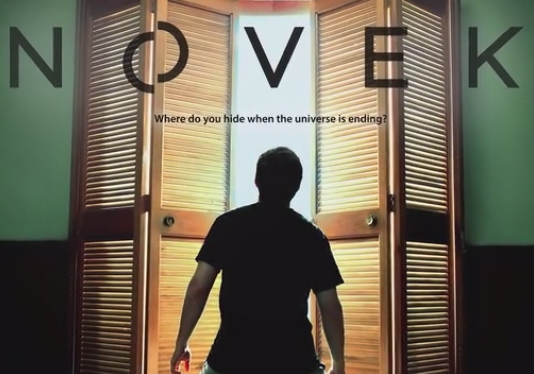
Tell us a bit about yourselves and what brought you to this point…
My brother (Jon) and I grew up making films for fun. We’d always mess around with cameras and make short films with our friends. That was our way of playing and it was great. But, then after high school we went our separate ways. I went off to college and for the next six years studied over seven different majors because I didn’t know what I wanted to do. I still loved film, but I didn’t think it was a viable way to make money (still don’t haha). So, I settled on a teaching job, but hated it so much. It was then that I realized how meaningless life can be unless you do what you’re most passionate about. Jon, on the other hand, was keenly aware of this as he decided to pursue film right out of high school. He spent a long time trying to convince me to write a story for him to film and by 2012 that’s exactly what I did. I resigned from teaching and spent the next three years making Novek with him and although we still have a long way to go, both of us have no regrets and are very excited about this project.
The promo for Novek is very evocative, it hints at a deeper story behind the apocalyptic framework – what is it that you feel makes this dystopian vision different from others?
Well, I think the biggest difference between this apocalyptic thriller and most others is the fact that you really don’t know what the danger is. With asteroid and natural disaster movies you know what’s happening and what the end result will be like. With zombie and epidemic thrillers you know what’s going on and what will happen if the trend continues. But, with Novek you’re seeing this strange, “portal-like” void in space that’s growing bigger and bigger. No one has any idea what it is or what will happen when it reaches Earth, so there’s virtually no way to predict the end-game. And if indeed it is a threat to our very existence, how do you fight against it? We’re literally powerless to do anything about it and we did this on purpose because we wanted to set up conditions, which could parallel conditions that we’re seeing in our World, today. Novek is more than just a sci-fi thriller. It’s an allegory of our future trends and how we react to the mystery surrounding them. Climate change and the exponential growth of technology are just like the “void” in Novek. We don’t quite understand the nature of these trends or where they’re leading us and we certainly don’t have a lot of control over them. There’s a certain level of anxiety that’s lingering in our time and so we want to explore that in a really cool way.
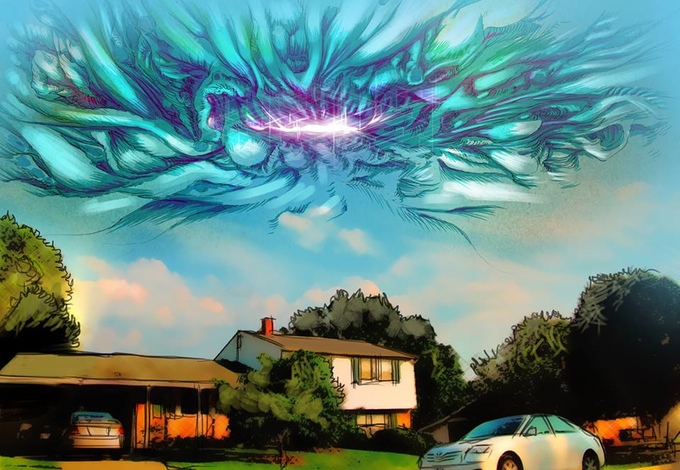
The characters you introduce are all quite atomised and solitary, they are individuals forging their own path. What do you think this says about how we would deal with a crisis of this magnitude? Will the end ultimately be everyone for themselves, or is there still room left for charity and solidarity in the face of annihilation?
Our main characters in Novek are different from the average person because we want to make this as unique as possible. We didn’t want to go for the typical hero/anti-hero because we want the audience to feel surprised at every step. But in regards to how we deal with this crisis, I think we would see a colorful assortment of responses ranging from very positive to very negative and this is what we convey throughout the series. Some people choose to help others whereas others see this as a license to do whatever the hell they want. People party, pray, loot, kill, and do all sorts of wild things because there are billions of us responding to this crisis, which means there are billions of different behaviors arising from this. It’s a very surreal experience. Even some of our main characters find their own sense of peace within this chaos and in many ways improve their lives because of the circumstances. But then some of our characters end their lives in tragedy. But, most people simply stop working, which means the economy stops running, so we see a shortage of goods and services being provided. That’s where some of the apocalyptic elements really come into play.

Who are your influences generally, and were there any specific ones for this project?
In regards to filmmakers, we have a lot of influences ranging from Paul Thomas Anderson to Daren Aronofsky. We also enjoy stories from Christopher Nolan and Werner Herznog. For sci-fi writers, we love Phillip K. Dick, Alfred Bester, Cory Doctorow, and Tim Maughan. But we’re also influenced by a long range of futurists like Jason Silva, Ray Kurzweil, Michio Kaku, and Peter Diamandis. For this particular film we were heavily influenced by the show, “Through the Wormhole”. In fact, that’s actually where we got the idea for Novek.
How do you feel about the Indie film scene at the moment? What are some of its current strengths and weaknesses?
The Indie film scene is more alive than it’s ever been! Because technology has gotten significantly cheaper there are far less risks in making films. Not to say that it’s a walk in the park necessarily, but its definitely not what it was like in the 70’s. Back then you had to work within the confines of established institutions because gear and editing was so costly. But now anyone can rent anything and outsource any job with the click of a button. It still takes a lot of work and skill to generate funding of course, but even that’s getting easier with online tools like Kickstarter. And because of this, many people who would otherwise never do film are now getting into it, so you’re seeing more unique and diverse movies.
However, the down side is that it’s over-saturating the industry so not only is it harder to market and generate a profit off your films, but it’s also caused the well-established Hollywood industry to take less risks. I mean, there’s a reason why we’re seeing so many re-boots. It’s much safer to use an already established franchise and make a cookie-cutter, blockbuster flick than it is to develop a brand new movie because they’re being challenged by independent companies who can make the same kind of movies. So Hollywood is re-directing their approach to cinema by investing in more sophisticated forms of technology such as the Oculus Rift and better CGI so that they can remain competitive. If they can’t make more stories that are better than the millions of other indie films out there, then they’ll try to make films that produce a more exciting experience for the viewer. That’s something, which is very difficult for indie filmmakers to compete against.
So, within this century as technology gets better and cheaper, you’ll see this constant “arms race” between Hollywood and the Indie scene where Hollywood will adopt the latest and greatest and the Indie scene will soon follow, forcing Hollywood to invent more ways to enhance the experience. But then the Indie scene will catch up again and Hollywood will once again have to re-invent themselves. It’ll go on like this for a while, but eventually making films will be as easy as making a personal website and that’s when things will level out to a point where the industry will move from large companies to individuals. It’ll kind of be like youtube where people post videos and only the best of the best go viral and make an honest buck. Not so good for those looking to make their millions in film, but certainly good for humanity as a whole.
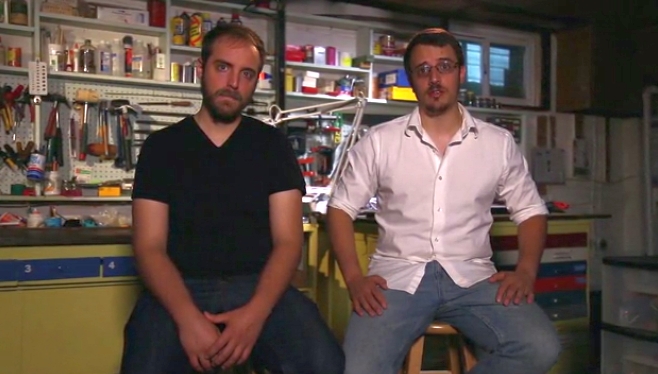
Jon and Matt Firman
What goes into figuring out the amount you want to raise through crowdfunding? Are there hard choices you had to make about what to include to find a balance between everything you need and an achievable goal?
Well, you want to make your film as cost-effective as possible. With that said, to actually make a quality film, you have to fork out a sizable amount of money. Developing a budget is like balancing act. On the one hand you want to get the best bang for your buck but on the other hand, you don’t want to skimp out too much on costs because you want to maintain quality and a suspension of belief. That means you need good lighting, actors who can do well, a cinematographer who can pick the right angles, and a location that actually makes sense and looks real. It’s very enticing to get your friends and family to act in your film or to use your run-down apartment as a location, but those decisions can fundamentally affect the quality of your film and thus, ruin the story. So often times you have to really go out of your way to find that right place and hire those right actors. And that’s where it gets costly.
Then if you’re looking to put your idea on Kickstarter, you find yourself with more challenges. You have to factor in the amount that Kickstarter and Amazon will take out of your pledges and the cost in making your prizes and that includes the time it takes to make them as well. If you don’t do that, then you’ll have to lower your budget for the film just to fulfill your pledge orders. Those factors can really increase the budget, but you want to be careful not to make your pledges too costly. It was easy for us to come up with big rewards, but very difficult to come up with ones that were feasible and cost-effective as well as cool and meaningful. It’s another balancing act that creates a lot of headaches, but it’s totally worth the time.
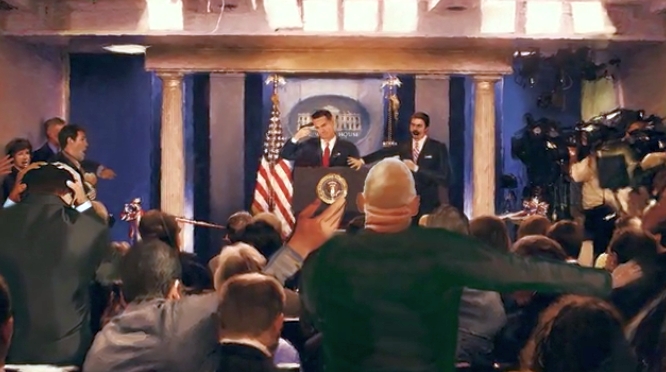
How did you go about bringing together the cast and crew?
Film school isn’t necessary nor sufficient to make it in the film industry, but it’s certainly helpful in finding the right people. Jon went to film school, but later dropped out when he found a nice job making corporate films. But, he met a few friends and re-connected with them when we started doing logistics for Novek. These were young guys doing grip work in corporate films and B-rated gigs who wanted to further their careers. And they had friends! So, it wasn’t that hard to find a good team of people who are ambitious and good at their craft. It just required a little searching and networking. And that’s paid off tremendously. We have a great DP (Justin Chiet) who runs his own production company and an amazing gaffer (Chris Allen) who has a lot of experience working in major productions.
In regards to actors, we reached out to the best theater groups in Maryland and all of the major universities and advertised our project. In hindsight it might have been better to go through SAG or a talent agency, but we lucked out and find some amazing people. In particular our main actor, Vince Eisenson, works for the Shakespeare Theater Company, and does a lot of work for Discovery and the History Channel. So, we were ecstatic when we found him and he agreed to play the role of “Sorin Turner”.
What do you hope for the future of Novek?
In the future, we see Novek growing from a short film to a full series. We spent a lot of time crafting this story and now we’re just about ready to pitch this idea to some prospective producers whom we’re already in contact with.
So there you have it, some interesting thoughts and advice from an Indie filmmaker. Thank you Matt for taking the time to answer these questions, and if those of you reading haven’t yet jumped over to Kickstarter to support the project then what are you waiting for? Let’s make sure this project gets the backing it deserves!






